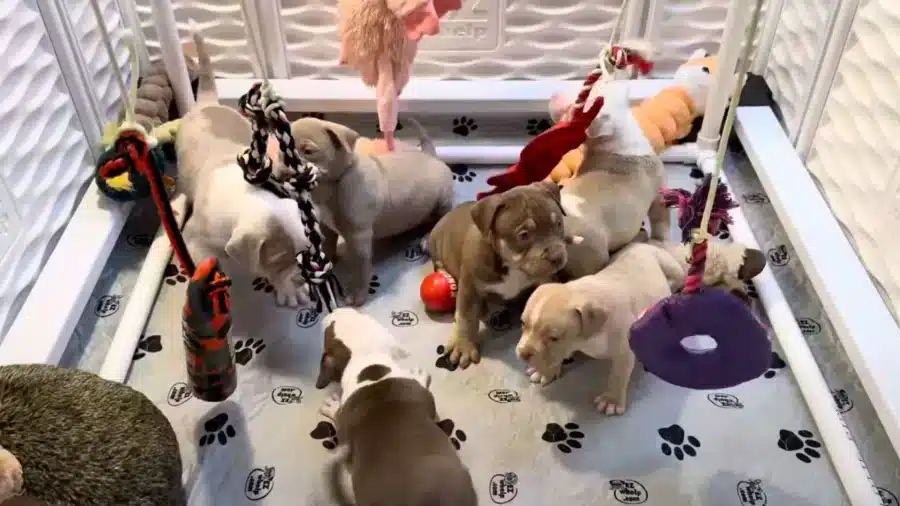Bringing home a new puppy is an exciting and life-changing experience. However, to ensure your furry friend settles in comfortably and happily, you need to be well-prepared. This detailed guide will provide everything you need to know to set up a loving and safe environment for your new pet.
What to Consider Before Getting a Puppy
Before committing to a puppy, it's crucial to evaluate whether a dog fits into your lifestyle. A puppy is a lifelong commitment that requires time, money, and dedication. Here are some key factors to think about before making a decision:
- Cost: Have you budgeted for the expenses of owning a puppy? Initial costs include vaccinations, bedding, toys, and food, while ongoing expenses include vet bills, insurance, and grooming.
- Lifestyle: Puppies need daily care, exercise, and companionship. If you work full-time, consider whether you have the time or resources for doggy daycare or a pet sitter.
- Your Home: Ensure your home is puppy-proof with a secure yard and designated spaces for sleeping and eating. Remove any hazardous items and create a safe environment for your pup.
- Household Readiness: Is everyone in the home on board with getting a dog? Assign responsibilities for feeding, walking, and training to ensure everyone plays a role.
- Veterinary Care: Research and find a trusted vet before bringing your puppy home. Scheduling an initial check-up and vaccinations is crucial for their health.
- Breed Research: Different breeds have different needs. Research the breed you’re interested in to make sure it aligns with your lifestyle and energy levels.
Essential New Puppy Checklist
1. Food and Water Bowls
Choose sturdy, non-tip bowls made of stainless steel or ceramic. These materials are durable, easy to clean, and resistant to bacteria buildup. Avoid plastic bowls as they can harbor bacteria and cause allergic reactions in some puppies.
2. High-Quality Puppy Food
Select a well-balanced, veterinarian-approved puppy food designed for your pup’s breed and size. Look for options with natural ingredients and avoid artificial preservatives. Research grain-free versus grain-inclusive diets based on your puppy’s specific dietary needs. Adding this to your new puppy shopping checklist ensures your pup gets proper nutrition from day one.
3. Comfortable Bed
Your puppy needs a cozy spot to rest. A soft, washable dog bed provides comfort and a designated sleeping area. Consider orthopedic beds for breeds prone to joint issues. This is a must-have on any new puppy owner checklist.
4. Crate and Playpen
A crate helps with house training and provides a secure space for your puppy. A playpen is useful for keeping them confined in a safe area when needed. Ensure the crate is large enough for your puppy to stand and turn around but not too spacious to avoid accidents.
5. Collar, Leash, and ID Tags
Ensure your puppy wears a well-fitted collar with an ID tag containing your contact details. A sturdy leash is essential for walks and training sessions. Consider a harness for better control, especially for smaller or more energetic breeds.
6. Puppy Pads and Cleaning Supplies
Accidents will happen, so puppy pads, enzymatic cleaner, and paper towels are essential for maintaining hygiene and house training. Consistently place pads in a designated area to encourage proper habits. A good checklist for new puppy owners always includes cleaning supplies to manage messes.
7. Chew Toys and Teething Aids
Puppies love to chew, especially during teething. Provide durable chew toys to prevent destructive behavior and keep their teeth healthy. Rotate toys regularly to maintain their interest.
8. Training Treats
Use small, healthy treats as positive reinforcement during training. This will help in obedience training and behavior development. Opt for low-calorie treats to avoid overfeeding.
10. Veterinary Care and Pet Insurance
Schedule a vet check-up soon after bringing your puppy home. Investing in pet insurance can help cover unexpected medical expenses. Keep vaccination schedules and deworming treatments up to date. A new puppy checklist isn’t complete without a healthcare plan.
11. Socialization and Training Tools
Enrol your puppy in a basic obedience class and introduce them to various experiences, people, and other dogs in a controlled setting for proper socialization. Well-socialized puppies grow into well-adjusted adult dogs.
12. Car Safety Gear
A dog car seat, harness, or carrier ensures your puppy’s safety during car rides and prevents distractions while driving. Avoid letting your puppy roam freely in the car for their safety.
13. Poop Bags and Waste Disposal
Responsible pet ownership includes carrying poop bags when taking your puppy on walks to keep public spaces clean. Consider biodegradable poop bags for an eco-friendly choice.
14. Health and Wellness Supplies
Stock up on flea and tick prevention, heartworm medication, and vet-recommended supplements to ensure your puppy’s long-term health. Establish a regular health maintenance schedule.
Expert Tips for a Happy and Healthy Puppy
- Stick to a Routine: Puppies thrive on consistency. Establish a feeding, walking, and bedtime schedule.
- Begin Training Early: Start basic commands like “sit” and “stay” from day one. Positive reinforcement works best.
- Provide Mental Stimulation: Engage your puppy with interactive toys and puzzle feeders to prevent boredom.
- Schedule Regular Vet Visits: Routine check-ups keep your puppy in optimal health and help prevent common illnesses.
- Supervise Playtime: Always supervise your puppy’s interactions with children and other pets to ensure safe and positive experiences.
- Introduce New Environments Gradually: Expose your puppy to different environments, noises, and experiences at a slow and controlled pace.
- Monitor Diet and Weight: Keep an eye on your puppy’s weight and adjust food portions accordingly to avoid obesity.
Wrapping Up
Preparing for a new puppy means gathering the right supplies and knowledge to ensure their health, happiness, and safety. With this comprehensive new puppy owner checklist, you’ll be ready to welcome your furry friend and provide the best possible start in their new home. Stay informed, be patient, and enjoy the rewarding journey of puppy parenthood!
FAQs
- What is the best food for my puppy? The best food depends on your puppy’s breed, size, and health needs. Consult with your vet for recommendations. Always check ingredient labels for quality sources of protein and essential nutrients.
- How do I potty train my puppy? Use positive reinforcement, take them out frequently, and establish a consistent routine to reinforce good habits. Be patient, as training can take weeks or months depending on the breed.
- When should I take my puppy to the vet? Schedule a vet visit within the first week of bringing your puppy home and follow up with routine check-ups every few months during their first year.
- How much exercise does my puppy need? Exercise needs vary by breed. High-energy breeds require more playtime, while smaller or less active breeds may need shorter walks and play sessions.
- What vaccinations does my puppy need? Core vaccinations typically include distemper, parvovirus, hepatitis, and rabies. Your vet will provide a customized vaccination schedule.
- By following this new puppy checklist and stocking up on the right essentials, your puppy will have everything they need for a happy and healthy life in 2025!
I am a highly skilled content writer and SEO expert with a passion for helping small businesses succeed in the digital world. With my extensive knowledge of the latest SEO techniques and strategies, I have successfully assisted numerous clients in improving their website rankings, generating more leads, and driving a significant increase in website traffic.
As a professional content writer and SEO expert, I am confident in my ability to contribute significantly to the success of small businesses. If you are seeking a results-driven, highly skilled digital marketer who can help you increase your ranking, convert new leads, and see a substantial improvement in website traffic, I would welcome the opportunity to collaborate with you.
Website: https://manmadewebsites.com/
Email: hello@digitalmarketingchap.com

